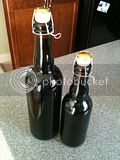My very humble attempt using Marris otter, etc..Hopeville calculator.. Got the TG way down.. May have mashed it a bit on the cool side and that I ground this fairly fine. The final product has thus far been tasted after 7 weeks of bottle conditioning. Not quite as smooth tasting as the original, a bit more bitter than I had hope for thus far...
malt & fermentables
# OZ
72% 11 0 Pale Malt (Maris Otter) info 37 3 ~
11% 1 12 Caramunich Malt 40 info 33 40 ~
10% 1 8 Belgian Dark Candi Sugar D2 info 32 160 ~
3% 0 8 Special B Malt info 30 150 ~
3% 0 8 Corn, Flaked info 37 1 ~
1% 0 2 Carafa II info 32 412 ~
Total 15 6
Batch size: 5.0 gallons
Original Gravity 1.074 measured (1.086 estimated)
Final Gravity 1.010 measured (1.021 estimated)
Color 34° SRM / 66° EBC (Black) not measured
Mash Efficiency 69% measured (really??)
(75% used for O.G. estimate)
mash
Given initial grain temp of 68 °F
And initial water to grist ratio of: 1½ quarts per pound
Protein Rest infusion of 5.77 gal at 141 °F to reach 133 °F for 20 mins
Conversion / Saccharification Rest infusion of 2.54 gal at boil to reach 154 °F for 60 mins
Mash-out infusion of 2.66 gal at boil to reach 167 °F for 15 mins
hops
use time oz variety form aa
boil 60 mins 1.75 Styrian Goldings info pellet 5.4
boil 30 mins 0.75 Hallertauer info pellet 4.8
boil 5 mins 0.25 Hallertauer info pellet 4.8
Boil: 6.0 avg gallons for 60 minutes Bitterness
38.3 IBU / 9 HBU
yeast
Wyeast Belgian Abby Ale II (1762) info
Alcohol
8.5% ABV / 7% ABW
(8.7% est. ABV / 7% est. ABW)
Calories
283 per 12 oz.





